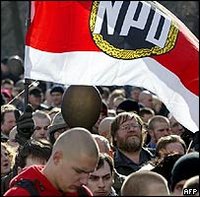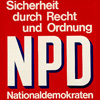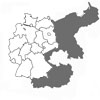
The Central Council of Jews in Germany is renewing the call for a ban on the NPD, or National-democratic Party of Germany [Nationaldemokratische Partei Deutschlands ]. Such bans have failed in the past, yet the Council is seeking to reactivate the urgency of this goal. To American readers, it may sound absurd to ban a political party you don’t like, so a little background helps explain the call: the NPD platform is based on xenophobia and scorn for what they deem non-German. As their charter describes, they are against the “Enlightenment-influenced Utopias and multiethnic excesses” of modernity. Like the Nazi party they emulate, they define enemies as those who don’t have the magical quality of inherent German-ness, enemies of “the Folk”; this, naturally extends to citizens of Turkish descent and Jews. Their followers perpetrate the waves of right-extremist violence that leave hundreds dead or injured annually and make certain areas of East Germany no-go zones for those who don’t look white enough.
But can you ban a political party just because what they say is trash and their influence is abhorrent? As Green Party political Volker Beck points out, “Banning the NPD won’t solve the problem of right-extremism. Their following would still be there and they would simply look for new forms of organization.” In addition to being ineffective, such a ban also risks admitting that the current democratic methods of combating hatred are ineffective: Heribert Rech of the Christain Democratic Union believes that “Party-banning-processes don’t get us anywhere; we must fight the NPD politically.” Finally, others claim that such a ban would lessen current awareness of the NPD’s actions, even if it eventually failed, only strengthening the party.
 These claims are all wrong. While banning the NPD won’t solve right-extremist violence, it will stop its condoning and legitimization from a political party that has recently made its way into Parliament and sits on many local councils. Forty-three thousand Berliners voted for the NPD in the last elections this fall; these are lost votes that should have gone to parties that want to use public funds for social benefit rather than hate. The more money is used to promote a philosophy of xenophobia, the more “okay” such destructive thinking becomes. It is an ignoramus' answer to East Germany's high unemployment (in some places, 25%) but it works when trumpeted loudly enough and in the right tone by men in suits who have the legitimacy of the political arena behind them.
These claims are all wrong. While banning the NPD won’t solve right-extremist violence, it will stop its condoning and legitimization from a political party that has recently made its way into Parliament and sits on many local councils. Forty-three thousand Berliners voted for the NPD in the last elections this fall; these are lost votes that should have gone to parties that want to use public funds for social benefit rather than hate. The more money is used to promote a philosophy of xenophobia, the more “okay” such destructive thinking becomes. It is an ignoramus' answer to East Germany's high unemployment (in some places, 25%) but it works when trumpeted loudly enough and in the right tone by men in suits who have the legitimacy of the political arena behind them.Claims that an attempt to ban the NPD would draw attention away from it are ludicrous at their core, and one wonders which of the non-NPD politicians who consistently condemn extremist violence and xenophobia would feel justified in shutting up if the NPD no longer existed. One must also look at the atmosphere in which the call for a ban comes: Germany has already banned Nazi-related emblems. In the sea of Hitler mustaches and “homeland” slogans at NPD rallies, swastikas remain out of sight because of the strict illegality of displaying one. Although Mein Kampf can be found at most Barnes & Noble’s in the United States with nary a raised eyebrow, it is notoriously difficult to find in Germany and even most libraries don’t keep copies available. Such a country refusing to ban a massive Neo-Nazi organization is dangerously strange.
 Finally, resistance to the ban often revolves around the distasteful idea of censoring politics, but is the NPD a political party or a hate crime organization? No one would dare call the Ku Klux Klan a “political party” in the United States, although for years they controlled the South with a specific social agenda. A glance at the NPD charter reveals ideas familiar to Americans raised on the rhetoric of the Religious Right: the importance of (heterosexual) family, anti-abortion stance, and pro death penalty. Not surprisingly, women appear on the group’s website only as contact partners for senior citizens’ or family affairs. Yet far beyond such conservative-but-not-criminal ideology are passages that call for an end to the German examination of its Holocaust past: “We Germans are not a nation of criminals!” The website also contains an image of Germany showing its pre-1945 borders, encompassing much of Poland and all the way up to Kaliningrad. Its discussion of the danger non-German-ness poses to the mystical inherent German-ness of the people is deeply troubling: no platform should be built on fairy tales.
Finally, resistance to the ban often revolves around the distasteful idea of censoring politics, but is the NPD a political party or a hate crime organization? No one would dare call the Ku Klux Klan a “political party” in the United States, although for years they controlled the South with a specific social agenda. A glance at the NPD charter reveals ideas familiar to Americans raised on the rhetoric of the Religious Right: the importance of (heterosexual) family, anti-abortion stance, and pro death penalty. Not surprisingly, women appear on the group’s website only as contact partners for senior citizens’ or family affairs. Yet far beyond such conservative-but-not-criminal ideology are passages that call for an end to the German examination of its Holocaust past: “We Germans are not a nation of criminals!” The website also contains an image of Germany showing its pre-1945 borders, encompassing much of Poland and all the way up to Kaliningrad. Its discussion of the danger non-German-ness poses to the mystical inherent German-ness of the people is deeply troubling: no platform should be built on fairy tales. 
This is not a group that should be allowed to wear the mantle of “political party” any more, or permitted in any way to participate in a democratic government. It is sad that the citizens have chosen such a group and that it cannot be defeated politically, as its growing numbers and influence attest, but the answer is not to continue to come up with self-contradictory reasons about why it should continue to appear on the ballot. Along with an NPD ban, educational measures to combat violence are needed, and sharp awareness of Germany’s problem with xenophobia must be maintained. We needn’t watch it continue to masquerade as a political platform, however.
Heribert Rech quote from "Neuer Streit ueber NPD Verbot," http://www.juden.de/.
Top NPD rally image courtesy BBC. Other NPD images courtesy NPD Homepage.

7 comments:
On this issue I'm actually torn: on the one hand I think a party like the NPD being so popular makes Germany look bad, but on the other hand I doubt that banning it would do anything to combat the right-extremist violence.
Also, I don't think that wearing the mantle of "political party" confers much prestige on a group, especially not here in Germany. Maybe you've heard of die PARTEI, the "political wing" of Titanic magazine whose platform includes re-erecting the Berlin wall (which surprisingly, 20% of Germans are rumored to support) or the Anarchistische Pogo-Partei Deutschlands whose platform includes the establishment of "Mitfickzentralen" and the slogan "Saufen! Saufen! Jeden Tag nur saufen." Apparently the latter received more votes in 1998 than the Communist Party (although perhaps my ability to gauge the popularity of the communism in Germany is distorted by my living situation).
I suspect that one of the main reasons the KKK was never a political party in the US is that it was (I think for most or all of its history) a secret organization. KKK members have definitely held high ranking positions in government, but the nature of the organization prevented them from presenting a unified political front. It's funny that you mention it though, because it seems that due to declining numbers the KKK actually formed a political party, the Knight's Party, in 2003. Plus the US has tons of other weird fringe political parties (The American Nazi Party, The Prohibition Party, The Pot Party, etc.) --granted most of them have never gotten anywhere near the support of the NPD.
I tend to think that political parties should be allowed to exist, no matter how abhorrent their platform, for the sake of free speech (Germany does have a constitution still, right?). But then I don't know how the capaign finance here works. I do agree that if political parties are to recieve public funds -for campaigning or otherwise- their platform should have to fall within the bounderies of the constitution. But the whole thing is rather tricky; I guess it falls into that hate-speech/free-speech grey area.
Good points. A couple notes: when parties reach Parliamentary (Bundestag) level, they receive public funds. Ergo NPD is receiving tax money.
Also, the KKK was secret partially because its platform of blatant hate would never fly in the public political arena (only in disguised, damped-down forms.) However, the NPD's platform is obviously acceptable for the public--which does beg the point you mention, whether banning them would stop hate crimes. That is, if the public already hates, are they merely searching for an outlet? I believe that "legitimate" forums sanction hate in a way that status as a fringe, weirdo group does not. In other words, hate can grow, or take on more socially acceptable-looking forms, with the appropriate outlet.
"Banning" the NPD doesn't need to mean making their name illegal, or removing their members' right to free speech, just barring them from the higher, legitimate levels of political representation and funding.
I blog frequently and I really thank you for your information.
This great article has really peaked my interest.
I will bookmark your site and keep checking for
new details about once a week. I opted in for your RSS feed
too.
My page make money internet
Hurrah, that's what I was seeking for, what a information! existing here at this blog, thanks admin of this site.
My web page: 2004 honda s2000 sale
I am curious to find out what blog system you're utilizing? I'm having some small security problems with my latest website and I'd like to find something more secure. Do you have any suggestions?
Take a look at my web blog ... garbage disposal troubleshooting
Hello everyone, it's my first go to see at this web site, and article is genuinely fruitful in support of me, keep up posting these posts.
My web page: wireless heart rate monitor
Thanks designed for sharing such a good idea, piece of
writing is good, thats why i have read it fully
Also visit my web-site ... fred starring in marvin marvin
Post a Comment